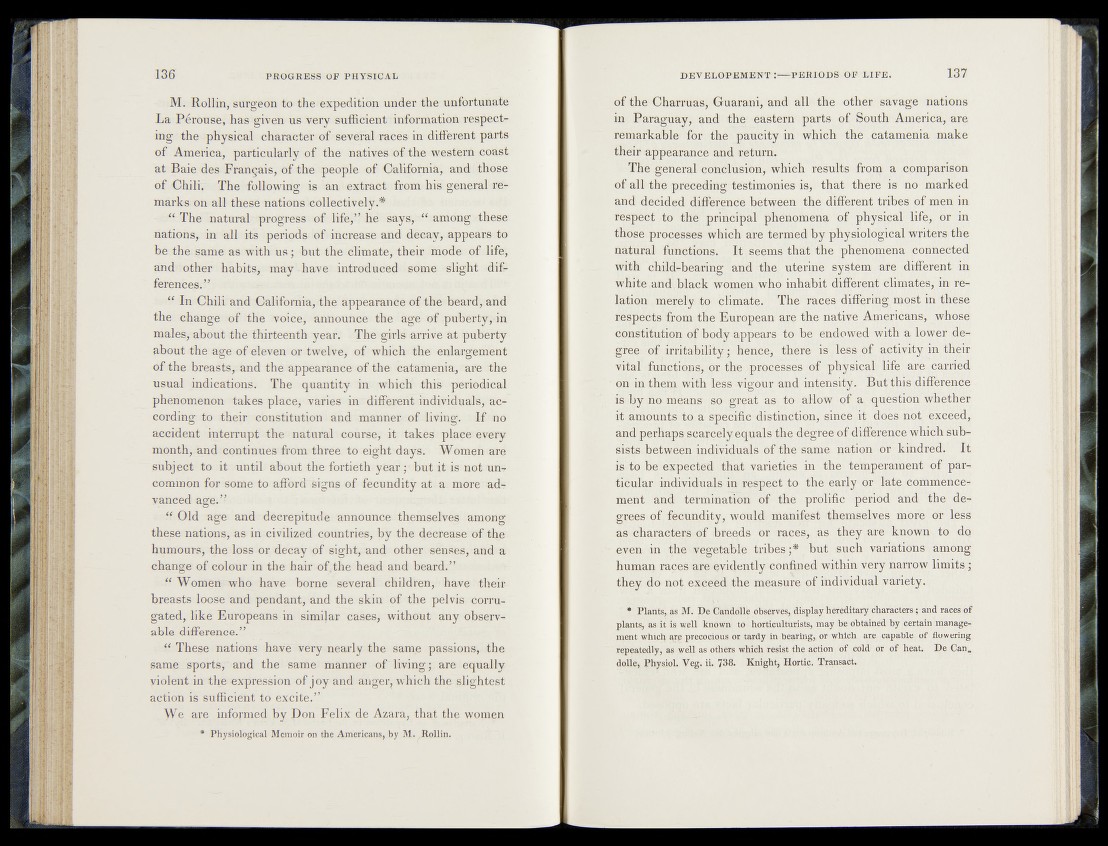
M. Rollin, surgeon to the expedition under the unfortunate
La Pérouse, has given us very sufficient'; information respecting
the physical character o f several races* in différent parts
of America, particularly of the natives of the western coast
at Baie des Français, of the people of California, and those
of Chili. The following is an extract from his general remarks
on all these nations ic®lleetively.#
“ The natural progress of lifefî’ hé says, “ among these
nations, in all its periodsdêfrûnerease afid decay, appears to
be.the same as with us ; but the climate, their modevig&ll%'
and other habits, may-have introduced some slight differences.^
p
“ In Chili and California, the appearance of the beard, and
the change *of the voice; announce the i age of -puberty,-in
males, about the thirteenth year. The girls arriveM» puberty
about the age of eleven or twelve, of which the enlargement
of the breasts, and the appearance- of the catamenia, are th e
usual indications. The quantity in which this periodical
phenomenon takes place, varies in different individualsyëfç*-
cording to theixr-^BS&itotion - and manner-,of living. If : no
accident interrupt the natural course, it takes place'evefy
month, and continues'from three to eight days. Womeii are
subject to it until about the fortieth year ;• but it is not un?
common for some to afford signs of fecundity at. a more advanced
age.’’
“ Old age and decrepitude announce themselves ' among
these nations, as in civilized countries, by the decrease-iÉ the
humours, the loss or decay of sight, and other senses, and a
change of colour in the hair of*the head and beard.”
m Women who have borne several children, have their
breasts loose and pendant, and the skin of the pelvis corrugated,
like Europeans, in simi}ar cases, without any observable.
difference.”
“ These nations have'very nearly the same passions, the
same_ sports/" and the same manner off living ;, are equally
violent in the expression of joy and anger, which the slightest
action is sufficient to excite.”
We are informed by Don Felix de Azara, that the women
* Physiological Memoir on the Americans, by M. Ilollin.
of tjie'Charruas, Guarani, and all the »-other savage nations
in Paraguay, and the^easteçn parts of » South America, are
remarkable»'for. the paucity-in 'wh^ch the catamenia make
their appearance and return.
The general conclusion, which results from a .comparison
of all the preceding; testimonid^ii^that there is no marked
and decided différence between,-,tl|e ,different tribes, of men in
respect to the principal phénoménaÉ, physical * life) or in
those processes which ate'térmedby physïologiteal'writers thé
natural functions. Iws&snslthât the phenomenâ$feonnected
with child-bearing and the uterine system t are /difteenp in
wlii te vand\black‘ .WbmpUj who! inhabit'’1' ^
] ati-om, merely .to climate.- ÎThé^racés differ»g;t4*bst in these
respects'*from the EuropeanMre the native Americmglè whosd
G£»nstitufion o f body 'appeats to'; be ^ eW c^ éd ^ ith a lower degree
of irritability; hence, there
vital *fonctions‘,_pr^ the /proc^m^ of physical' fifej|â|;p,^carried
on i n w i t h lpssVigour and, intensify. But this dilli unto
isnby no means* .SO great as. to allow a qu'estioii^wbèther
it amounts to. a specific distinAion; sinyejitrTlpOb note-exceed.-
and perhaps,sea^eelveqpals the 4|^rfeé*ofd i ffeiénl'é*w h iS ^ u p-
sists betwem individuals,of the same nmiqte-pr kindred/- It
is to be’expected, .that variqti&Tnn ,the»' tetopérawënt /of par-,
tiCular individuals in respect to the earXy*» or late^cpmmehce.-'
ment and,* termination of the prolific pjlllid and the '.dêT
grees of fecundity, would inanifest themSetees morV oV^Kss
asr eharacters'-of breeds ’Or, races, as they^are knowh* to dq
even in the vegetable tribes,.;* but s.ufch variationsyaipong
human races are evidently confined withju Very narrow limits ;
they do not exceed the measure of individual .variety.
* Plants, as M. De Candolle observes, display hereditary chaActers ; and races of
plants, as it is well known to » horticulturists, may be obtained by certain manage-,
ment whicty a|e precocious or tardy in bearing, or which are, capable, of flowering
repeatedly, as well as others which resist the action “of cold or of heat. De Can.
dolle, physiol. Veg. ii. 738. Knight, Hortie. transact.